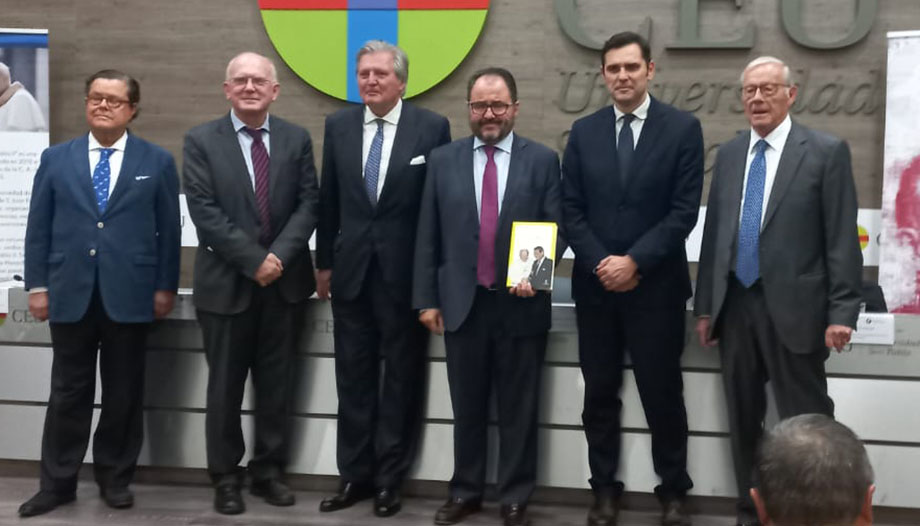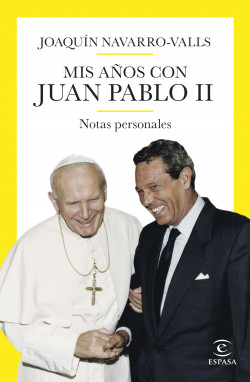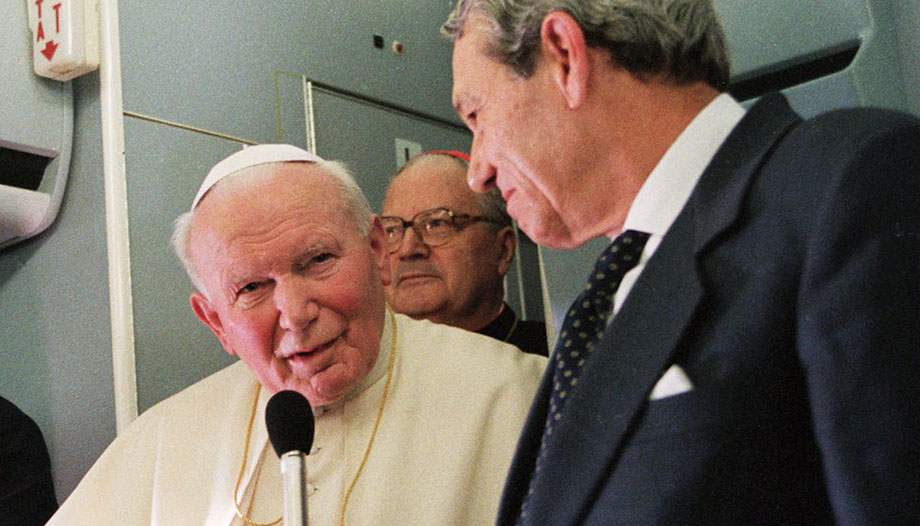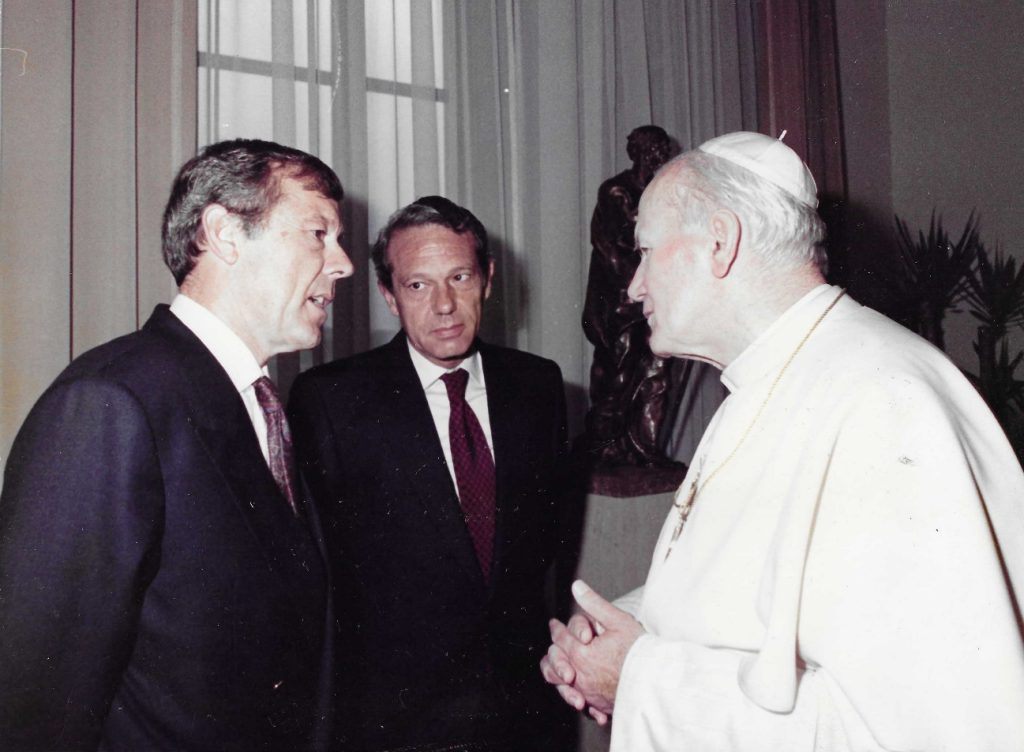On May 24, four years ago, the then director of the Holy See Press Office, Alessandro Gisotti, wanted to give the name of Joaquín Navarro-Valls to the work room of journalists accredited to the Vatican Press Office.
"Giving the name of Navarro-Valls, who had also been president of the Foreign Press Association in Italy, to the room where accredited journalists work every day reporting on the Vatican, I said, is 'a sign to underline that, in the Church and in the Holy See, information counts and must always count more'," said Alessandro Gisotti at the presentation at CEU of the book published by Espasa. An event attended by the Nuncio of His Holiness Bernardito Auza, Cardinal Rouco Varela, the president of the Academy of Jurisprudence and Legislation, Manuel Pizarro, and the rector of the University CEU San Pablo, Rosa Visiedo, among other personalities.
In Gisotti's opinion, now deputy managing editor of the Vatican Media, "this is certainly the most important and lasting legacy, in my opinion, that Director Navarro has left us: communication is fundamental in today's world and this is also true for the Church and the Holy See"..
In the interview with Omnes, Rafael Navarro-Valls underlined something that Alessandro Gisotti also said: "'Joaquín Navarro Valls was not a spokesman, he was a spokesman, he was a spokeswoman. the spokesman', praising his prestige among all journalists accredited to the Holy See".
Also speaking at the event were Diego Contreras, editor and professor at the Universidad de la Plata. Santa Cruz (Rome); former government spokesman Iñigo Méndez de Vigo; Jesús Trillo-Figueroa, State lawyer and member of the Honorary Council of the Institute Karol Wojtyla-John Paul II; and Fernando Lostao, director of the Foundation Ángel Herrera Oria, who moderated the event.
Rafael Navarro-Valls, president of the Permanent Conference of Ibero-American Juridical Academies and vice-president of the Royal Academy of Jurisprudence and Legislation of Spain, commented on his brother Joaquín's book.

What has been your task in the genesis and editing of this book of your brother Joaquín's personal notes on Pope St. John Paul II?
-My intervention consisted in reviewing the excellent version prepared by the editor, Diego Contreras, making some suggestions, and encouraging Joaquín when he was alive to finish the version contained in more than 600 pages of annotations. The spokesman for 22 years wrote down his impressions day by day, with a great effort, because he did it at the end of days full of incidents and which meant a great deal of work for him.
You coordinated the edition of the book 'Navarro-Valls, el portavoz', with valuable testimonies about your brother Joaquín and his work in the Holy See. Is that a book about your brother, and this is a book about St. John Paul II?
-Indeed, the book "The Spokesman, which I had the honor of coordinating, contains 20 testimonies of personalities from Europe and America about Joaquín. It is a book of statements by people who knew and dealt with him. Naturally there are also references to St. John Paul II, but as you say, it focuses more on the figure of the spokesman.
The Memories The narrator of Joaquín's life looks towards John Paul II, so that the narrator remains more in the shadows. But since this is a book that covers an arc of more than 20 years, it is inevitable that the figure of Joaquín also appears.

My years with John Paul II
Did your brother consult you about John Paul II's proposal to head the Sala Stampa and become spokesman for the Holy See? Did he speak to you about any conditions he would place on accepting the position? One has been mentioned: access to the leader, the Pope in this case.
-Rather than consulting me, he informed me that he had been offered these positions. It seemed to me to be a fortunate choice and I spoke to him about how much good he could do from that position. In fact, he told me that he had set two conditions: direct contact with the Pope and transparency. Hence the many times he had lunch and dinner with him, and his frequent access to him. Stanislaw Dziwisz, the Pope's own personal secretary, played an important role in this access. Regarding his efforts to make the Press Room transparent, I remember his decision to communicate to the press the principle of Parkinson's that John Paul II had, which led to a clash with the Secretariat of State.
You have been a member of Opus Dei for many years, as was your brother Joaquín. Did Blessed Álvaro del Portillo, prelate of Opus Dei during those years, or later his successor, Bishop Javier Echevarría, say anything to you?
-The members of the Opus Dei We are absolutely free - and correlatively responsible - for the exercise of our professional work. I do not believe that I received "instructions" from the Prelature. We never spoke about this.
On Tuesday this book was presented at the CEU. Any ideas that you think are worth highlighting from what was said there?
-All the speakers made very intelligent interventions. To say one that struck me, Alessandro Gisotti, former spokesman for the Holy See and current deputy editorial director of the Vatican Media, observed that "Joaquín Navarro Valls was not a spokesman, he was a spokesman". the spokesman", praising his prestige among all journalists accredited to the Holy See.
Is it possible to be a friend, a very good friend, of a Pope? Your brother was, as far as we can see. With filial friendship, you said, he saw and treated him as a father. Did the Pope see him as a son? There are photos that speak for themselves.
-Joachim denied that he could be friends with the Pope. And he quoted Plato who said that for there to be friendship between two people there must be a certain equality between them. My brother added that the distance between John Paul II and himself was enormous. But the truth is that there was friendship between them. It is enough to see the photos to which you refer to discover the complicity between them. In my modest opinion, Plato was not right: friendship between unequals is possible.
The Pope often made jokes about him and his mission as spokesman. In them one can detect that affection that exists between a father and a son.
Tell me something that is not in the book, or that could have been and is not. Any confidences that your brother told you.
-I remember that at the Cairo conference he used harsh words to describe the difference between what Al Gore - Vice President of the United States - was saying ("we do not intend to defend the use of texts to promote abortion") and what, at the command of his team, was actually being done. Joaquín publicly stated: "The draft document on population, whose main promoter is the United States, contradicts Mr. Gore's statement". In case there were any doubts, when an American journalist asked the spokesman: "You claim that the Vice President of the United States is lying". Joaquín, without flinching, replied: "Yes, that is what I say". The latter was omitted from the book.
And now, something that is. It's 640 pages, and it does readers a favor.
-Joachim had a big head, but also a big heart. Twice in the book the spokesman's tears are described: once, when, before millions of people following his words on television, he announced the extreme seriousness of John Paul II. The other, when he read to John Paul II a dispatch from the Reuters agency that included some words of the schismatic Lefebvre about the Pope: that he was a heretic, that he no longer had the Catholic faith, etc. He could not finish reading these things. He got a lump in his throat and tears came to his eyes. St. John Paul II encouraged him to continue and to ease the tension he alluded to Lefebvre's possible illness. Joachim replied that, as a doctor, he could understand an illness, but that the devil can also act in history through illness.
Joaquín Navarro-Valls was spokesman for the Holy See for twenty-two years, in the pontificates of St. John Paul II and Benedict XVI, the first non-Italian in that position, and played an important role in Vatican diplomacy. This is a bit surprising...
-Yes, it is very exceptional for a spokesman of the "Greats" to remain so long in office. Even his dismissal during the pontificate of Benedict XVI was at his own request. I remember that RAI made a program of great repercussion connecting simultaneously with three spokesmen of three "greats": the one for the United States, the one for the Soviet Union and Joachim for the Holy See. At one point in the three-way conversation, the spokesmen of the two big countries (they were in office for no more than six years, Joaquín for 22) expressed their astonishment at Joaquín's tenure for so many years. This was made possible by the great rapport between the "Boss" and his spokesman.

You explained that John Paul II raised three fronts: the battle against the process of secularization; the second, the Soviet bloc: his objective was to protect human rights; and in the third world, "the enemy was the incredible morass of poverty". Anything to add or clarify?
-These three fronts are described throughout the book. But what is really interesting is the great serenity and good humor with which John Paul II faced the serious issues he had to deal with. In other words, the human and spiritual side of a saint. Joaquín was fascinated by the "human side" of the Pontiff: his courage and bravery, his deep joy, his strength and harmony of spirit, and so on. Naturally, also his spiritual side and related virtues. For example, how he prayed. In the Nunciature of an African country, where they were staying, Joaquin entered the chapel for a moment and found the Pope praying on his face before the tabernacle. Joachim waited for an hour and left quietly. The next morning he asked the nuns what time the Pope had retired to his bedroom. They told him that he had spent the whole night in prayer.
Can you tell an anecdote about John Paul II's request for mercy for a condemned man in the United States?
-It is contained in the book. In synthesis, it happened like this. On one of John Paul II's many trips, he arrived in the city of St. Louis (Missouri, USA). He learned, through Joaquin, that a convicted murderer, a Vietnam veteran (Darrell J. Mease) was going to be executed during his visit. The Pope intercedes for his life with the governor. The governor's press chief suggested that John Paul II ask the governor directly. Thus, at the conclusion of a solemn ceremony in St. Louis Cathedral, with President Clinton and Governor Carnaham seated in the front row, the Pope stops before the governor and with all simplicity says: "Have merci on Mr. Mease". With identical simplicity the governor replies: "I will do it". In this way, the condemned man saved his life.
You also mentioned an event related to Frank Sinatra's song My Way. John Paul II is already a saint, was his brother, in your opinion??
-I believe Joaquín was a man with many human and also supernatural virtues. When my brothers and I were moving Joaquín's coffin to the hearse, it is true that in an inexplicable way my cell phone went off and we began to hear the chords of one of Joaquín's favorite songs: My Way. I interpreted this as a way of telling us that he was on the road to success.








